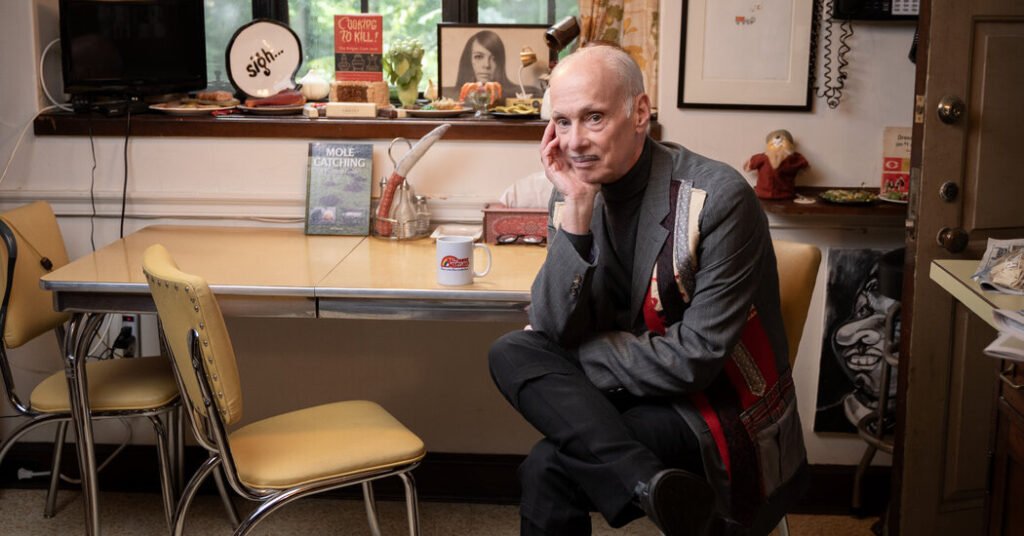The 1998 John Waters film “Pecker” ends with an unlikely crowd carousing in a seedy basement bar/impromptu photo gallery in Baltimore. Strippers and one busty, enthusiastic art collector dance on tables as a talking Virgin Mary icon watches. It’s a jubilant, chaotic and naughty party open to anyone with a sense of humor, just the way the director likes it.
Mr. Waters, 78, gained a cult following in the 1970s with delightfully shocking films like “Multiple Maniacs,” “Female Trouble” and, of course, the raunchy “Pink Flamingos” before breaking big with “Hairspray,” in 1988.
Since then, Mr. Waters has built an empire of camp, now comprising more than a dozen films, spoken-word shows and numerous books, including his 2022 debut novel, “Liarmouth,” which has been optioned for a movie that Mr. Waters hopes will star Aubrey Plaza.
Mr. Waters, a Baltimore native, grew up in Lutherville, Md., a suburb he described in a recent phone interview as “upper-middle-class everything.” Yearning for escape, he had his mom drop him off at a Baltimore beatnik hangout called Martick’s, even though he was underage. “She said, ‘Maybe you’ll meet your people here,’” he recalled.
“I did find my people — bohemia!” he said.
Since those days, Mr. Waters has become an unofficial spokesman for all things Baltimore, which was one of The New York Times’s 52 Places to Go in 2024. The city has embraced him, too. It honored him with an official day, Feb. 7, 1985 (it was a one-off), and the all-gender restrooms at the Baltimore Museum of Art, the institution to which he has bequeathed his sizable art collection, are named for him.
Though Mr. Waters has apartments in San Francisco and New York and spends summers in Provincetown, Mass., he lives primarily in North Baltimore and has no plans to change that. “If I had to give up everywhere,” Mr. Waters said, “this is where I’d live.”
Here are his five favorite places in Baltimore.
The Charles Theater
A neon marquee graces the brick facade of the Charles Theater. First opened as an all-newsreel cinema, the Charles now screens primarily independent movies and hosts periodic revival series. Mr. Waters has a special place in his heart for the theater, which his friend Pat Moran managed for years. “That’s where ‘Polyester’ opened,” Mr. Waters said, referring to his 1981 film. A major Easter egg awaited those at the premiere, since a scene in the film had been shot at the theater. In the movie, the heroine’s philandering husband owns a porn theater, and a flashback shows its exterior. “‘My Burning Bush’ was the title on the marquee,” Mr. Waters said, and people were coming out “zipping up their zippers.”
When he first started visiting Peter’s Inn, Mr. Waters knew it as Motorcycle Pete’s, after the owner, his friend Peter Denzer. “He was a biker, and he was in ‘Desperate Living,’” Mr. Waters said, recalling his 1977 dark comedy. “He played one of Edith Massey’s goons.” Mr. Denzer later sold the place to Bud and Karin Tiffany, who transformed it from dive bar to locally sourced eatery. Today, Mr. Waters said, “it still looks like a biker bar,” but “the food is absolutely amazing.” A mounted blue marlin hangs behind the bar (Mr. Tiffany caught it on his 16th birthday, Ms. Tiffany said) and Ms. Tiffany writes the menu by hand. But Peter’s also makes a mean martini and serves a pâté — beloved by Mr. Waters — that arrives in a lidded glass container, its smooth surface artfully arrayed with herbs and fruit.
With its Art Deco sign, neon-bathed interior and well-curated jukebox (including David Bowie and Björk), the seven-decade-old Club Charles — across the street from the Charles Theater — is “still the coolest place in Baltimore,” Mr. Waters said. He loves the no-nonsense bartenders (“They’ve been there forever and ever”) and “unpredictable” patrons. Mr. Waters started frequenting the bar in the 1970s, when it was called the Wigwam and had a rough reputation. The owner, an Indigenous woman named Esther Martin, ran it, Mr. Waters said, buzzing in only people who didn’t seem rich: “It was Studio 54 in reverse.” Once, Mr. Waters recalled, “I saw somebody bite somebody’s nose off in there. It was scary. But it was jumping!”
Metro Baltimore
On any given night at the performance space Metro Baltimore — formerly known as the Metro Gallery — you never know quite what to expect. Which is why Mr. Waters loves it. In February, he attended “anti-Valentine’s gay night,” a dance party crowded with young L.G.B.T.Q. people and heavy metal fans. “So the gay people there are the ones that do not fit in gay bars,” Mr. Waters said. “I’m one of them. The first time I ever went to a gay bar, I thought, ‘I might be queer, but I ain’t this,’ because I was looking for bohemia.” The Metro, he said, feels like a modern bohemia. The program (think acts with names like LustSickPuppy and Pansy Division) is as motley as the crowd, and includes drag nights, record releases and film premieres.
Atomic Books
As an author, screenwriter and former bookstore employee, Mr. Waters knows his bookshops. Atomic Books stands out, he says, because it is “one of the only places where you can get big fashion magazines from all over the world,” and also has “a huge true-crime section.” In it, classics such as “Helter Skelter,” about the 1969 Charles Manson murders, sit alongside cult favorites like “Panzram,” about the early-20th-century serial killer Carl Panzram. The shop, whose motto is “Literary Finds for Mutated Minds,” also carries a vast array of John Waters merchandise, and receives his fan mail. A bar in back serves local beer, cider and mead, including a Union Craft Brewing I.P.A. called Divine. It might be the perfect place to raise a glass and toast Mr. Waters’s cinematic diva who shares the beer’s name. And who knows whom you might meet in the aisles? “If you’re ever looking to score sexually, go to bookshops,” Mr. Waters advises. “You always meet smart people, and they’re cute.”

